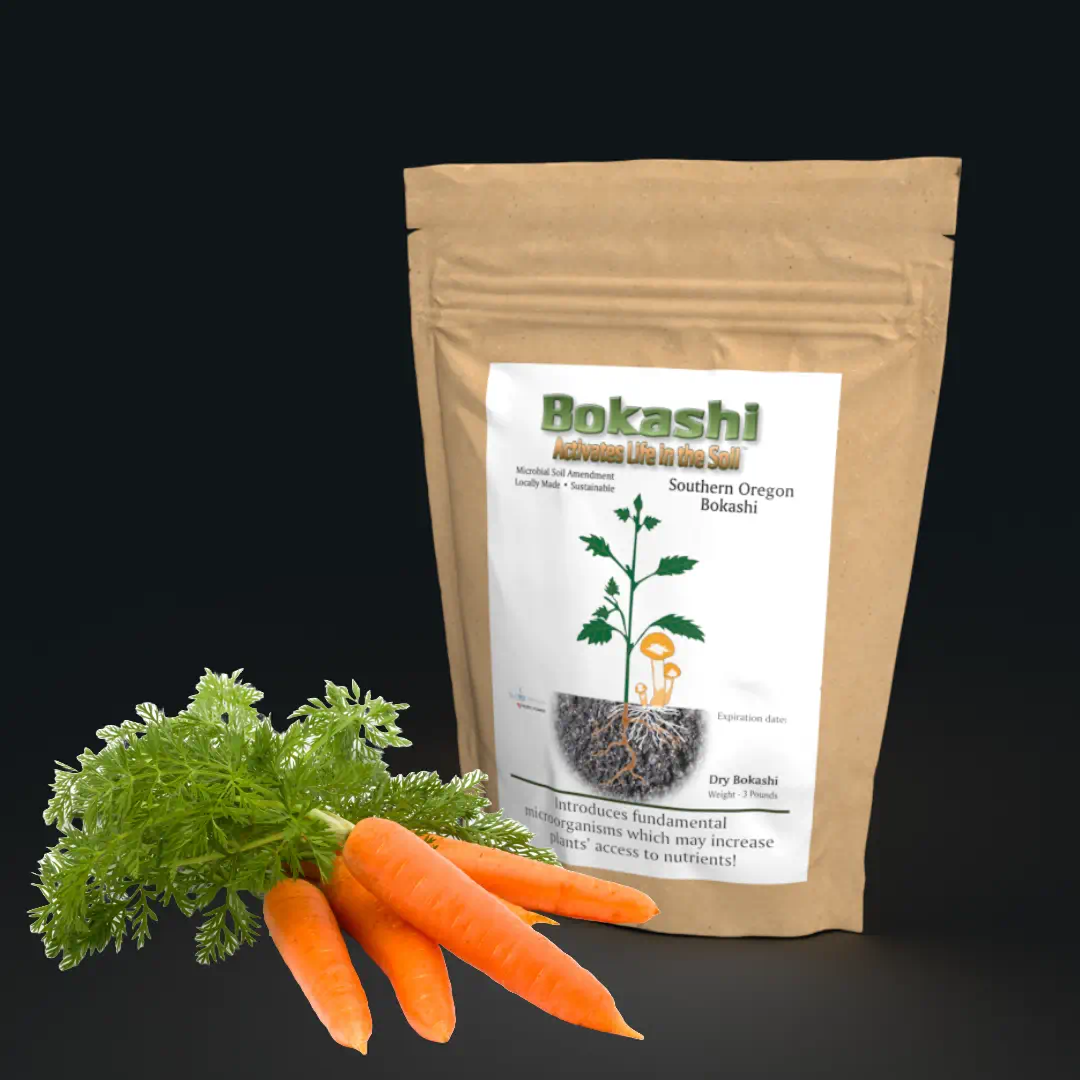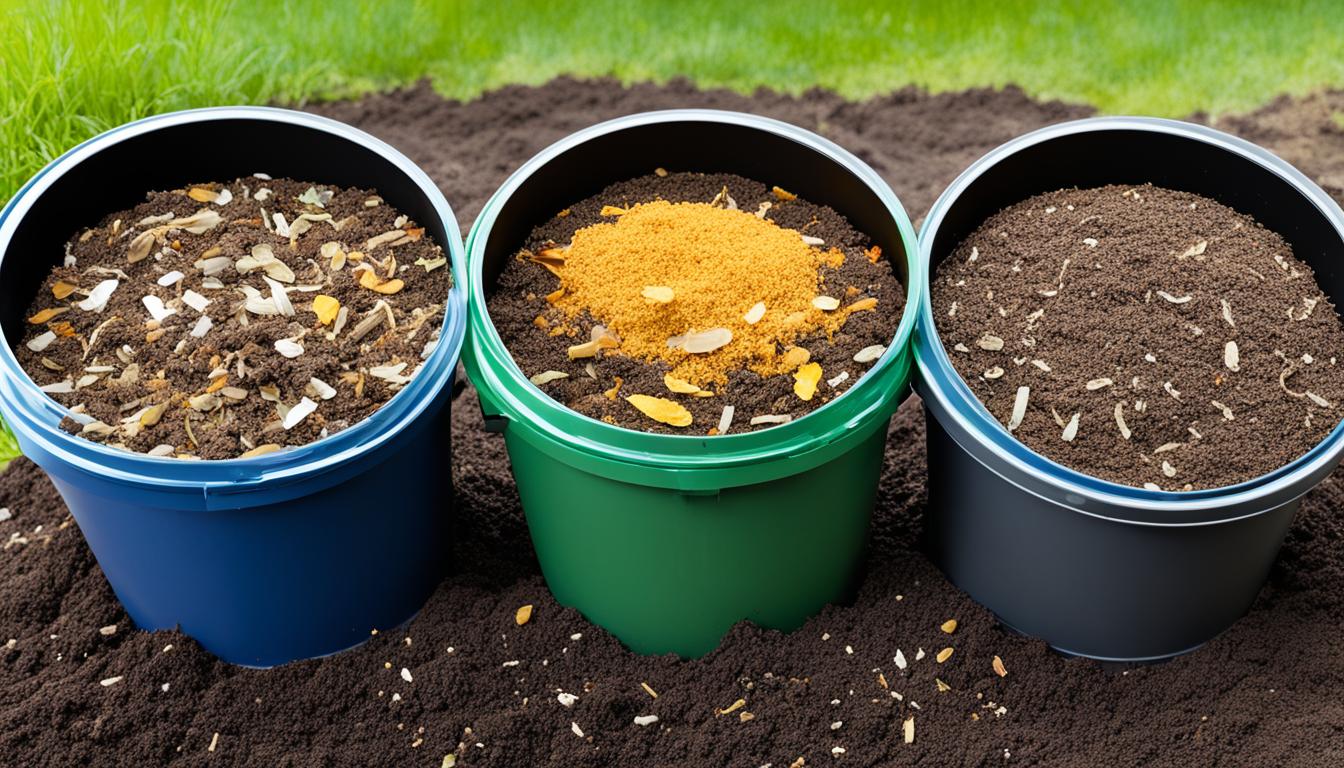Building Nature's Potential
With Southern Oregon Bokashi
Join the Farming Revolution! The Time is Now to Super-Charge Your Biology and Bring Your Soil to Life with the Magic of Southern Oregon Bokashi.


What is Bokashi composting?
Bokashi composting is a fermentation process that converts kitchen scraps, including meat and dairy, into a nutrient-rich soil amendment through the action of specific beneficial microbes.

How do I start Bokashi composting?
Start with a Bokashi bucket and Bokashi bran. Layer your kitchen waste in the bucket and sprinkle Bokashi bran over each layer. Seal the bucket to create an anaerobic environment and let it ferment.

Can I add Bokashi compost directly to my garden?
Yes, but it needs to be buried in the soil to finish decomposing. Directly burying the pre-compost from your Bokashi bucket into your garden soil allows it to complete the composting process and enrich the soil.

How long does it take for Bokashi compost to be ready for the garden?
The fermentation process in the Bokashi bucket typically takes about 2 weeks. After burying the pre-compost in your garden, it usually takes another 2-4 weeks to fully integrate into the soil.
Bokashi Composting Essentials
A Gardeners' FAQ Guide
Explore the essentials of Bokashi composting with our concise FAQ guide, tailored for gardeners at any level. Learn the basics, discover how to use Bokashi compost in your garden, and unveil the environmental benefits of this sustainable composting method. Whether you’re starting out or looking to refine your composting practices, this guide offers practical advice and insights to help you enrich your soil, reduce waste, and promote a healthier garden ecosystem efficiently.
what is
Bokashi composting?
Bokashi composting is an anaerobic fermentation process that efficiently converts kitchen scraps, including meat and dairy, into a nutrient-rich soil amendment. This method relies on specific beneficial microbes, usually provided in Bokashi bran, to ferment organic waste without the need for traditional composting conditions.
How do I start
Bokashi composting?
To begin Bokashi composting, you need a Bokashi bucket and a supply of Bokashi bran. Start by placing a layer of kitchen waste in the bucket, then sprinkle a generous amount of Bokashi bran over it. Continue layering waste and bran until the bucket is full. Seal the bucket tightly to create an anaerobic (oxygen-free) environment, which is crucial for the fermentation process.
What can I
compost with Bokashi?
Bokashi composting is versatile, allowing you to compost almost all types of kitchen waste. This includes fruits, vegetables, cooked and uncooked meats, dairy products, and even small bones. Avoid composting liquids, as they can disrupt the fermentation process, and items with high salt content, which can inhibit microbial activity.
How Do Microbes Work
in Bokashi Composting?
Bokashi composting relies on Effective Microorganisms (EM), including lactic acid bacteria, yeast, phototrophic bacteria, actinomycetes, and beneficial molds. These microbes ferment organic waste, reducing pH and producing compounds that promote plant growth and suppress odors. Together, they turn waste into nutrient-rich compost without the usual composting odors or pathogens.
How do I know if my
Bokashi is working?
A successful Bokashi composting process will produce a slight vinegary or sweet-sour smell, indicating fermentation is occurring. You may also notice a white mold on the compost’s surface, which is a good sign. If the contents start to emit a putrid smell or show signs of decay, this may indicate a problem with the process.
Is Bokashi
composting odor-free?
Bokashi composting is designed to be relatively odor-free, especially when properly maintained. Unlike traditional composting, which can emit a strong decomposing smell, Bokashi compost should only produce a mild vinegary odor due to the fermentation process. Any strong, unpleasant odors may indicate an imbalance or a need to adjust your composting practices.
Can I add Bokashi compost
directly to my garden?
Yes, but Bokashi compost must first be buried in the soil to finalize the decomposition process. After fermenting in the Bokashi bucket, the pre-compost should be mixed into the garden soil, where it will continue to decompose and enrich the soil with nutrients.
How long does it take for Bokashi
compost to be ready for the garden?
The initial fermentation in the Bokashi bucket takes about two weeks. Once buried in the garden, the pre-compost typically integrates with the soil within another two to four weeks, depending on soil conditions and temperature.
Can Bokashi leachate
be used in the garden?
Yes, the liquid that drains from the Bokashi bucket, known as leachate, is a nutrient-rich byproduct that can be diluted with water (at about a 1:100 ratio) and used as a powerful liquid fertilizer for plants.
Can I use Bokashi
compost in potting mixes?
Absolutely. Bokashi compost is an excellent addition to potting mixes, enhancing nutrient content and microbial activity, which benefits plant health and growth. Ensure the compost is fully decomposed before mixing it into potting soils.
What should I do if my
Bokashi bin starts to smell bad?
If your Bokashi bin emits a foul odor, it may indicate that the anaerobic environment has been compromised or that the balance of waste to Bokashi bran is off. Ensure the lid is sealed tightly and adjust your layering technique, adding more bran if necessary, to suppress any unwanted smells.
How should I store Bokashi
compost until I'm ready to use it?
If you’re not ready to use your Bokashi compost immediately, store it in a sealed container or plastic bag to maintain its anaerobic condition. Keep it in a cool, dark place until you’re ready to incorporate it into your garden or potting mix to ensure it remains effective.
How does Bokashi
benefit my garden soil?
Bokashi compost significantly enriches garden soil with beneficial microorganisms, which improve soil structure, enhance moisture retention, and provide essential nutrients. These improvements support plant health and yield, making Bokashi an invaluable component of sustainable gardening.
Is Bokashi composting
environmentally friendly?
Bokashi composting is highly sustainable, reducing waste sent to landfills, cutting down greenhouse gas emissions, and recycling nutrients back into the soil. It’s an eco-friendly method that complements a green lifestyle by minimizing ecological impact.
How can I troubleshoot a bad
smell coming from my Bokashi bin?
A bad smell can indicate improper sealing of the bin or an imbalance in the compost material. Check the seal on your bin and consider adjusting the amount of Bokashi bran you’re using. If the problem persists, examine the types of waste being composted and reduce items that may be disrupting the process.
Can I use Bokashi
composting year-round?
Yes, Bokashi composting can be conducted indoors throughout the year, making it an excellent option for continuous composting regardless of outdoor conditions. Its flexibility and efficiency make it suitable for all climates and seasons.
How can Bokashi composting
reduce household waste?
By allowing you to compost a wider range of kitchen scraps, including meat and dairy products not typically suited for traditional composting, Bokashi composting can significantly reduce the amount of household waste sent to landfills.
What are the long-term benefits
of Bokashi composting for soil health?
Over time, regular use of Bokashi compost improves soil fertility, enhances the presence of beneficial microbes, and builds a healthier, more resilient garden ecosystem. This leads to healthier plants, better yields, and a more vibrant garden.

